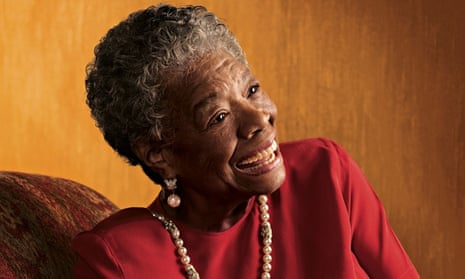I came to know Maya Angelou in the early 1980s through Decca (Jessica) Mitford, the most leftwing Mitford sister, who was then living in California. This white aristocratic woman and the African American Maya proceeded, in the days of segregation, to drive together through the bitterly racially divided state of Arkansas. Upon being stopped and questioned by the police about their relationship, Decca would exclaim that Maya was her daughter. It was not really possible in age terms – Decca was 11 years older – and in racial terms? Decca simply said in her haughty voice: “These things just happened, my good man.”
In 1983, Decca called me to say that Maya needed somewhere to stay in London. I had met her several times while staying with Decca in California and reporting on the US electoral cycle in which that state played so crucial a part. I was rarely at home in London, so I was more than happy that she should take the house over. And take it over she did. So it was that she lived with me sporadically in attendance, in Kentish Town, for nearly two months – writing. Every evening she’d be down Leighton Road having a drink or two in the Irish pub, the Gloucester Arms. Some mornings, I’d come down and she’d be writing at the dining table. She’d suddenly get up and start singing at the top of her voice – there can’t have been a neighbour who couldn’t hear her. One day Salman Rushdie, still on the run from the fatwa against him, came for dinner. Maya relished the frisson as his Special Branch protection embedded themselves in my study.
She managed to be both imperious and absolutely one of the people at the same time. I had lived in Africa, and so had she; we both loved the continent and talked politics, music and poetry late into the night. We could not have come from more diverse beginnings. I the public school-educated son of an Anglican bishop, she the daughter of segregated America. We talked endlessly of the struggle in South Africa. She loved that I had been thrown out of university for leading an anti-apartheid sit-in.
A decade later, I was sitting at her own kitchen table in her home in Winston-Salem, North Carolina. Maya had invited me down for her to read me her poem On the Pulse of Morning, commissioned by Bill Clinton. She would deliver it that very week at his presidential inauguration. Even in the context of pots bubbling on the stove, washing-up in the sink, her delivery of the middle lines was vast.
“You, the Ashanti, the Yoruba, the Kru, bought
Sold, stolen, arriving on a nightmare
Praying for a dream.
Here, root yourselves beside me.
I am that Tree planted by the River,
Which will not be moved.
I, the rock, I the River, I the tree
I am yours – your passages have been paid.
Lift up your faces, you have a piercing need
For this bright morning dawning for you.
History, despite its wrenching pain,
Cannot be unlived, but if faced
With courage, need not be lived again.”
Tears rolled down my face. Two days later, on the pulse of morning, on 20 January 1993, I was standing on the roof of the Farmworkers Union building on the corner of North Capitol Street, and there, 200 yards away on the dais, beneath the dome of the US Capitol, stood Maya… even she now dwarfed by the scale of the inaugural crowd and the building above her.
Maya Angelou was poet, singer, raconteur, activist and friend; friend too, so far as I could ever divine, to many thousands. That kitchen table moment in Winston-Salem had been rare indeed. Normally there would have been a dozen or more sitting drinking tea, or wine. Her faithful cohort, Lydia, eternally on hand, and others too.
Beside her huge voice and its amazing range in both the sung and the spoken word, Maya had a boundless humour. But she combined it with accessible wisdom. For example, she wrote this of racism:
“Prejudice is a burden
That confuses the past.
Threatens the future,
And renders the present
Inaccessible.”
I last saw Maya for a balmy evening at her house in Harlem in 2012. She was dependent upon oxygen by then but still travelling the country in her “rock singer” bus. Equipped with a double bed, shower, kitchen and the rest, she used it to carry her to every performance. That night we were, as so often, gathered around another kitchen table, Lydia pouring the wine. Maya started singing her very favourite cockney songs. My Old Man’s a Dustman – how she loved “cor blimey trousers”. And finally, her all-time favourite, Right Said Fred.
By the time she reached the part about moving the piano and the verse in which “they had to take the wall down”, she was convulsed with laughter and so were we. Did we sing it 20 times in the years I knew her? She had been taught both songs by the aristocratic Decca. I was fortunate indeed to know and love Maya Angelou. As Barack Obama remarked on her death: “she was a phenomenal woman.”

Comments (…)
Sign in or create your Guardian account to join the discussion